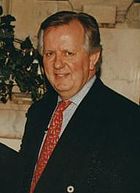London mayoral election, 2004
|
|
|||||||||||||||||||||||||||||||||||||||||
|---|---|---|---|---|---|---|---|---|---|---|---|---|---|---|---|---|---|---|---|---|---|---|---|---|---|---|---|---|---|---|---|---|---|---|---|---|---|---|---|---|---|
|
|||||||||||||||||||||||||||||||||||||||||
|
|||||||||||||||||||||||||||||||||||||||||
|
First preference votes by London borough. Blue boroughs are those with most first preference votes for Steven Norris and red those for Ken Livingstone.
|
|||||||||||||||||||||||||||||||||||||||||
|
|||||||||||||||||||||||||||||||||||||||||
The 2004 election to the post of Mayor of London took place on 10 June 2004. It was being held on the same day as other local elections and the UK part of the 2004 European Parliament elections, so Londoners had a total of five votes on three ballot papers. Polling opened at 07:00 local time, and closed at 22:00. See: UK elections, 2004. The Supplementary Vote system was used.
Ken Livingstone gained the Labour party's nomination on 2 January 2004, three weeks after being re-admitted the Labour Party, after deputy Mayor Nicky Gavron, the previous candidate-elect, stepped down in favour of Livingstone.
From the Manifesto booklet
Ken Livingstone - Standing up for London
Steve Norris - For a Safer London
Simon Hughes - A New Mayor for a Greater London
Frank Maloney - Stop the career politicians
Lindsey German - Londoners deserve Respect
Julian Leppert
Darren Johnson - Quality Life, Quality London
Ram Gidoomal
Lorna Reid - We live here too!
Tammy Nagalingam
London-born comedian Lee Hurst seriously considered standing as a candidate in the election. His comedy club had been under threat of redevelopment, and this had re-ignited a spark of political ambition. His manifesto would probably have included policies such as scrapping bus lanes and the congestion charge, improving public transport (including the re-introduction of bus conductors and AEC Routemaster buses), and tackling crime and abandoned cars.
...
Wikipedia





